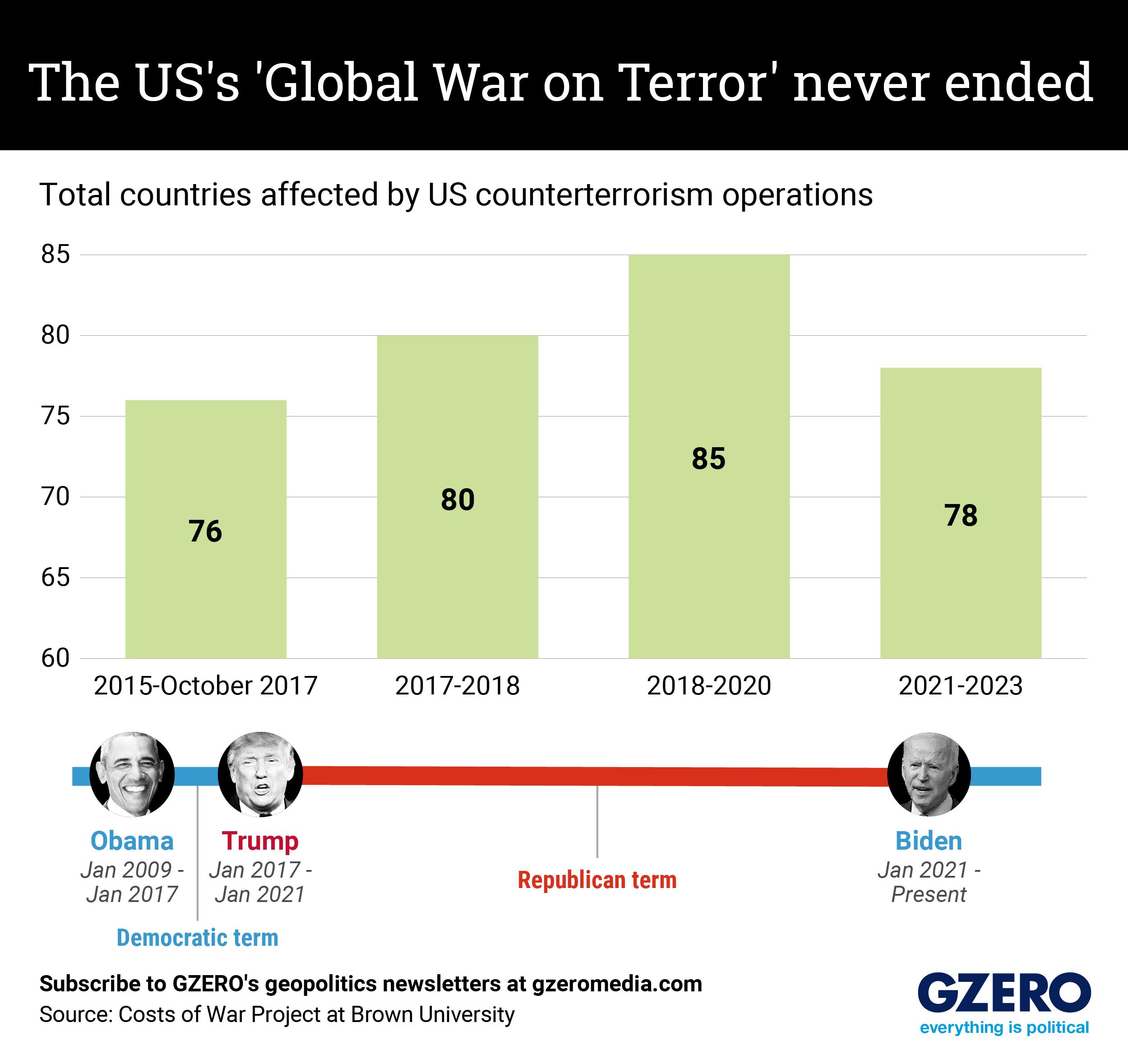December 10, 2023
Presidents Barack Obama, Donald Trump, and Joe Biden all pledged, on some level, to narrow the scope of the global war on terror and reduce US overseas military commitments.
In 2013, Obama said the US should not define its fight against terrorism “as a boundless ‘global war on terror.’” In 2019, Trump said: “Great nations do not fight endless wars.” And on the campaign trail the same year, Joe Biden vowed to “end the forever wars in Afghanistan and the Middle East.”
Yet, the number of countries where the US conducts counterterrorism operations and training has largely remained steady under all three presidents, according to data from the Costs of War project at Brown University. The study includes an array of factors, such as where troops involved in combat or potential combat were stationed, where air and drone strikes occurred, and countries where the US offered counterterrorism training or assistance.
Costs of War found that under Biden the US has conducted air and drone strikes in at least four countries – Afghanistan, Iraq, Somalia, and Syria (and likely Yemen). Its latest report also shows that from 2021 to 2023, US service members engaged in combat and detention, using force on the ground against militants/terrorism suspects in at least nine countries: Afghanistan, Cuba, Iraq, Kenya, Mali, Somalia, Syria, United Arab Emirates, and Yemen.
Comparatively, the data from 2015 to 2017 showed 15 countries hosted US combat troops involved in counterterrorism operations, and air and drone strikes occurred in seven.
The forever war continues. Biden did pull US troops from Afghanistan, ending the longest conflict in US history, but the war on terror still grinds on in other countries under his watch – though often in far more covert ways than when the military campaign first began.
American taxpayers continue to foot the bill of this war, which has already cost more than $8 trillion. Meanwhile, there hasn’t been a terror attack in the US on the same scale as 9/11 in the time since, but critics of the war on terror say it’s locked America into an unwinnable, never-ending conflict.More For You
Ian Bremmer sits down with former US Ambassador to NATO Ivo Daalder to unpack a historic shift in the transatlantic alliance: Europe is preparing to defend itself without its American safety net.
Most Popular
Think you know what's going on around the world? Here's your chance to prove it.
U.S President Donald Trump, U.S. Vice President JD Vance, and U.S. Secretary of State Marco Rubio pose for a family photo with other representatives participating in the inaugural Board of Peace meeting, at the U.S. Institute of Peace in Washington, D.C., U.S., February 19, 2026.
REUTERS/Kevin Lamarque
Argentina, Armenia, Belarus, Egypt, Indonesia, Jordan, Pakistan, Paraguay, Vietnam – to name only a few.
A poster featuring Andrew Mountbatten-Windsor, formerly known as Prince Andrew, is installed on a sign leading to the parking area of the Sandringham Estate in Wolferton, as pressure builds on him to give evidence after the U.S. Justice Department released more records tied to the late financier and convicted sex offender Jeffrey Epstein, in Norfolk, Britain, February 5, 2026.
REUTERS/Isabel Infantes
British police arrested former Prince Andrew Mountbatten-Windsor today over allegations that in 2010, when he was a UK trade envoy, he shared confidential government documents with convicted sex offender Jeffrey Epstein.
© 2025 GZERO Media. All Rights Reserved | A Eurasia Group media company.
